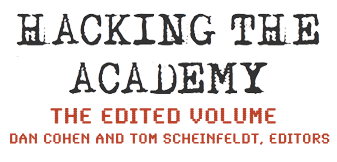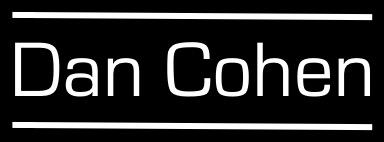 I’m delighted that the edited version of Hacking the Academy is now available on the University of Michigan’s DigitalCultureBooks site. Here are some of my quick thoughts on the process of putting the book together. (For more, please read the preface Tom Scheinfeldt and I wrote.)
I’m delighted that the edited version of Hacking the Academy is now available on the University of Michigan’s DigitalCultureBooks site. Here are some of my quick thoughts on the process of putting the book together. (For more, please read the preface Tom Scheinfeldt and I wrote.)
1) Be careful what you wish for. Although we heavily promoted the submission process for HTA, Tom and I had no idea we would receive over 300 contributions from nearly 200 authors. This put an enormous, unexpected burden on us; it obviously takes a long time to read through that many submissions. Tom and I had to set up a collaborative spreadsheet for assessing the contributions, and it took several months to slog through the mass. We also had to make tough decisions about what kind of work to include, since we were not overly prescriptive about what we were looking for. A large number of well-written, compelling pieces (including many from friends of ours) had to be left out of the volume, unfortunately, because they didn’t quite match our evolving criteria, or didn’t fit with other pieces in the same chapter.
2) Set aside dedicated time and people. Other projects that have crowdsourced volumes, such as Longshot Magazine, have well-defined crunch times for putting everything together, using an expanded staff and a lot of coffee. I think it’s fair to say (and I hope not haughty to say) that Tom and I are incredibly busy people and we had to do the assembly and editing in bits and pieces. I wish we could have gotten it done much sooner to sustain the energy of the initial week. We probably could have included others in the editing process, although I think we have good editorial consistency and smooth transitions because of the more limited control.
3) Get the permissions set from the beginning. One of the delays on the edited volume was making sure we had the rights to all of the materials. HTA has made us appreciate even more the importance of pushing for Creative Commons licenses (especially the simple CC-BY) in academia; many of our contributors are dedicated to open access and already had licensed their materials under a permissive reproduction license, but we had to annoy everyone else (and by “we,” I mean the extraordinary helpful and capable Shana Kimball at MPublishing). This made the HTA process a little more like a standard publication, where the press has to hound contributors for sign-offs, adding friction along the way.
4) Let the writing dictate the form, not vice versa. I think one of the real breakthroughs that Tom and I had in this process is realizing that we didn’t need to adhere to a standard edited-volume format of same-size chapters. After reading through odd-sized submissions and thinking about form, we came up with an array of “short, medium, long” genres that could fit together on a particular theme. Yes, some of the good longer pieces could stand as more-or-less standard essays, but others could be paired together or set into dialogues. It was liberating to borrow some conventions from, e.g., magazines and the way they handle shorter pieces. In some cases we also got rather aggressive about editing down articles so that they would fit into useful spaces.
5) This is a model that can be repeated. Sure, it’s not ideal for some academic cases, and speed is not necessarily of the essence. But for “state of the field” volumes, vibrant debates about new ideas, and books that would benefit from blended genres, it seems like an improvement upon the staid “you have two years to get me 8,000 words for a chapter” model of the edited book.

Leave a Reply
You must be logged in to post a comment.